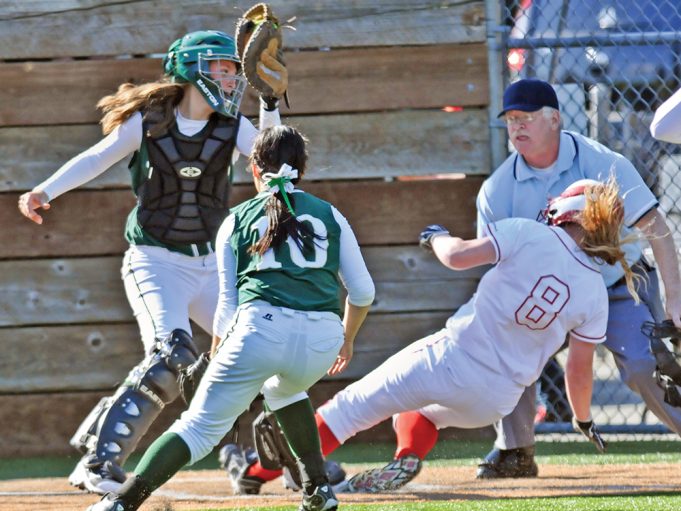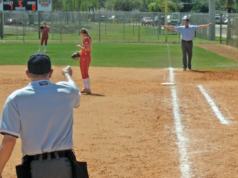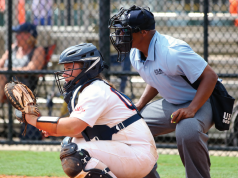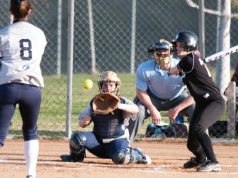It’s a terrible feeling. You’ve blown a call. You know it. Your partner may or may not know it. What’s worse, the blown call is a rule interpretation. There is the possibility of a protest. But the coach and players don’t know you’ve missed it! Great! You continue with the game. All is well, you think.
Then the unthinkable happens. Almost the exact play happens again, to the same team! Now, do you call it correctly the second time or perpetuate the error?
It depends. (Isn’t that a non-committal response?) I categorize the problem as “situational umpiring.” It really depends on whether or not either team gains an unfair advantage over the other. It depends on whether the teams will accept the second play being ruled likewise, after already setting (an erroneous) precedent. Enough of the conjecture. Let’s look at what actually happened and how we made amends after the fact.
The situation occurred in a state-tournament slow-pitch game played under USSSA rules. I was the plate umpire. R3 was on third. No outs, third inning. The game was close and well played.
B4 hit a screaming line drive toward R3. All R3 could do was turn sideways and take the shot in the hip, while standing on third base. The ball ricocheted toward the third-base dugout. I immediately yelled, “Dead ball!”
Oops. Under USSSA rules, the ball is live when it hits a baserunner who is still in contact with the base. If a defensive player could have made an out, you call an out on the play. In that situation, the third baseman didn’t have a play on the ball. While players on both teams were checking to see if R3 was OK, B4 strolled down to first. I waited to see if everyone was OK and B5 entered the box. While the pitch was on the way to B5, my brain sent the alarm. I had missed the call! I should have let the play continue.
Should you stop the game immediately?
Now the dilemma was whether to stop the game and tell the teams of the incorrect ruling. I chose not to do that. Between innings, I talked with my partner about the play and he agreed that we had missed it.
Then the unthinkable happened. In the fifth inning, with R3 on third and R1 on first, left-handed batter B6 came to bat. R1 was huge, slow of pace. B6 hit a screamer toward R1. R1, too, was on the base when the line drive hit him in the thigh. The ball dropped down in front of R1 as he began to hobble in circles behind the first baseman, trying to walk it off. That time neither my partner nor I said anything. However, the first baseman immediately went to R1 to see if he was OK. B6 laid his bat down and started removing his batting glove as he strolled toward first. The pitcher came over, picked up the ball and the players again checked to see if everyone was OK. R1 hobbled down to second and B6 went to first. R3 stayed at third.
While the players were mingling around, my partner and I conferred. The question was whether we were going to tell the teams what they could have done, since the ball and the play was live. We decided to remain mum.
So how did we make amends … after the fact? As soon as the game was over, my partner and I called both teams together at the pitching rubber while they were shaking hands. It was a tournament and both teams had more games to play. We told them of our error and what should have happened in both instances; that the ball was in play. We did that in case (by way of yet another incredible concidence) it happened to them later, on another field or even on our field. The second baseman’s eyes lit up just a bit, and with a grin, he said, “You know, we could have had a double play on that play at first.” Chagrined, I said, “Yes, that is correct.”
The teams appreciated our honesty and I think we made the best of a bad situation. I’m not proud of the erroneous call. But I know learning took place that night — among umpires and players. How would you have made amends after the fact?
What's Your Call? Leave a Comment:
Note: This article is archival in nature. Rules, interpretations, mechanics, philosophies and other information may or may not be correct for the current year.
This article is the copyright of ©Referee Enterprises, Inc., and may not be republished in whole or in part online, in print or in any capacity without expressed written permission from Referee. The article is made available for educational use by individuals.


















